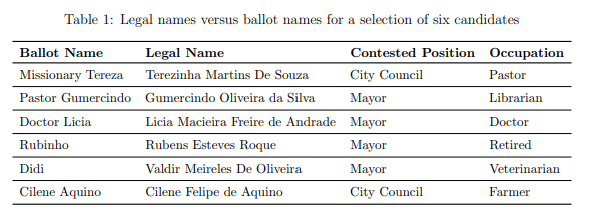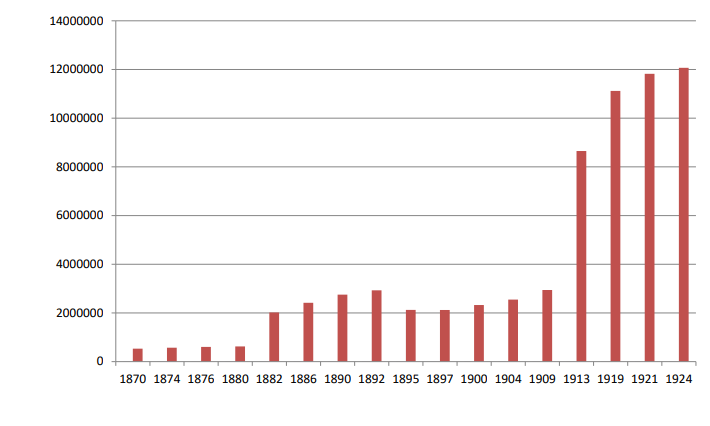Electoral incentives shape candidates’ decisions to cultivate certain group identities. Dan Posner, for example, famously showed how Zambian candidates respond to electoral incentives by cultivating certain tribal or linguistic identities.[1] While these theories have been largely elaborated in the African and Indian contexts by scholars of ethnic politics, their lessons apply across many geographies and to group identities that may not classify as “ethnic’” under conventional definitions. In the 2012 presidential election, for example, Mitt Romney famously sought to downplay his identity as member of the Church of Jesus Christ of Latter-day Saints, while cultivating a broadly attractive civil religious identity. These patterns relate to broader arguments around voting behavior, which highlight how candidates leverage their group identities to reduce the uncertainty voters face in an “ambiguous” political world.
I argue, however, that rather than responding to electoral incentives by cultivating ambiguity-reducing identities, certain electoral contexts may instead incentivize candidates to increase ambiguity around their group identities. I build my theory of “strategically ambiguous identities” with reference to literature around strategically ambiguous policy platforms. This is the idea, famously summarized by Anthony Downs, that candidates often “becloud their policies in a fog of ambiguity.” In particular, I draw on the idea of “false consensus bias’’ or the idea that ambiguous policy positions may allow voters with different policy preferences to optimistically presume a candidate’s platform is aligned with their respective, diverging preferences.
Similarly, when voters observe a candidate without a clear group identity, false consensus bias plausibly leads them to underestimate the likelihood that she belongs to a group they dislike. By avoiding action that might denote a specific group identity and instead cultivating an ambiguous identity, a candidate can thus attract out-group voters, who, if they knew her identity, might spurn her. The tradeoff in cultivating an ambiguous identity is that her fellow group members can no longer easily recognize her as one of their own. It follows that candidates will tend to cultivate ambiguous identities when they cannot rely on their own social group to deliver victory, which will tend to be the case under less proportional rules (where the winning threshold is high) and when their social group is smaller.
I study the case of Evangelical leaders running for office in Brazilian municipal elections. This context provides four advantages. First, similar to racial, tribal, and caste identities, Evangelical identity tends to attract Evangelical voters, but repel non-Evangelical voters. Second, Brazilian Evangelical leaders have the option of explicitly cultivating their Evangelical identity via distinctly Evangelical ballot names or cultivating an ambiguous identity by eschewing these names. In Table 1, the first two candidates use Evangelical ballot names while the other candidates use legal names, nicknames, or other professional titles. Third, voters in municipal elections simultaneously elect city councils via open list proportional rules (where winning thresholds are relatively low) and mayors and vice mayors via majoritarian rules (where winning thresholds are relatively high). This allows me to examine whether, compared to candidates in city council races, candidates in mayoral races, where there is a stronger incentive to attract non-Evangelical voters, are more likely to cultivate ambiguous, rather than Evangelical, identities. Finally, there is considerable variation in the share of the Evangelical population across Brazil’s nearly 5,600 municipalities. This provides even richer variation in electoral incentives, allowing me to test whether the tendency to cultivate an ambiguous identity in mayoral races shrinks in municipalities with relatively larger shares of Evangelical voters.

Consistent with the idea of strategically ambiguous identities, I find that candidates are more likely to cultivate an ambiguous identity in majoritarian mayoral races compared to proportional city council races, and that this difference shrinks as the proportion of Evangelical voters increases. Candidates who run in both mayoral and city council races are more likely to use Evangelical ballot names when running in city council races. For example, Iranil De Lima Soares from the municipality of Ladario in the state of Matto Grosso do Sul, used the Evangelical ballot name “Pastor Iranil” when running for city council in 2008 and 2012 but used the non-Evangelical ballot name “Iranil Soares” while running for mayor in 2016.
While previous work demonstrates how candidates seeking to attract voters across groups cultivate specific, widely-held identities, I present strategically ambiguous identities as an alternative solution to this same objective. This contribution is notable at a moment when many scholars question policy-centric models of voter behavior in favor of those that center on group identities. If group identities, rather than policy platforms, are the key drivers of voter behavior, a full account of strategic ambiguity in electoral competition must account for if and how candidates create ambiguity around these identities.
The lessons from this study relate to other contexts in and outside of Brazil. Former Brazilian president Jair Bolsonaro, for example, was characterized as cultivating a “Catholic-Evangelical ambiguity.” As Evangelical Christianity grows across Africa and Southeast Asia, it will be interesting to see whether the theory I outline accurately predicts when Evangelical candidates highlight this identity or shroud it in ambiguity. Looking beyond religion, this strategy seems germane to candidates from the growing population of ethnically ambiguous populations in Africa and the United States who face the option of maintaining or reducing this ambiguity as they seek to attract voters.
This blog piece is based on the fortcoming Journal of Politics article “Strategically Ambiguous Identities: Evidence from Evangelical Clergy in Brazilian Elections” by William Reuben Hurst.
The empirical analysis hasbeen successfully replicated by the JOP and the replication files are available in the JOP Dataverse.
About the Author
Reuben Hurst is an Assistant Professor in the Management and Organization department at the University of Maryland Robert H. Smith School of Business.

